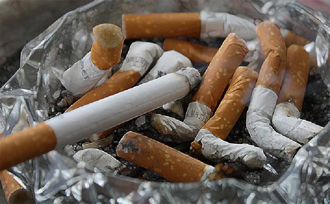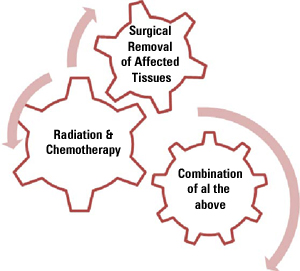Did You Know?
Lung cancer causes more deaths than any other type of cancer.
1.6 million people die worldwide due to lung cancer
India reports 15-20% annual rise of Lung cancer cases - Dr. B.K. Sharma, Acting Director of RST Regional Cancer HospitalCancer is a state wherein body cells grow uncontrollably. This causes a mass of growing cells called a "tumor." Such cells can also migrate to other parts of the body to form secondary tumors. These tumors create serious complications which can lead to fatality.
What is Lung Cancer?
A lung cancer essentially affects the lungs. Lungs are respiratory organs of the human body, and hence causative agents of lung cancers usually enter the body through the air that one breathes. Lung cancer is the most common kind of cancer in men and the fifth most common in women.
What Are The Causes Of Lung Cancer?

The most important cause of lung cancer is smoking (cigarette, pipe, and cigar). It has been found that 90% of all lung cancer cases have been due to tobacco smoking. Tobacco smoke contains around 4000 chemicals, out of which about 60 are found to be carcinogenic (cancer-causing). The most harmful of these chemicals are nitrosamines and polycyclic aromatic hydrocarbons. It has also been found that the risk of cancer drastically reduces as soon as the person ceases smoking.
Other causes of lung cancer are radon (a naturally occurring gas), asbestos (natural mineral used in construction), some metals (cadmium, chromium, arsenic), exhaust from diesel engines, radiations, chemicals in paint and certain diseases that affect the lung (e.g. tuberculosis). Family history of cancer can also put a person at greater risk. The closer the relative, the greater is the risk.
Quiz Yourself
Q. Can a non-smoker get lung cancer?
Yes, non-smokers can get lung cancer too. 'Passive smoking' or inhalation of tobacco smoke released by another person can be as harmful as smoking
Does Lung Cancer Have Any Symptoms?
A Silent Killer
Nearly 25% of all lung cancer cases do not present any symptoms in the initial stages.
Early stage lung cancer is usually symptomless. In the advanced stage, symptoms like a persistent cough, blood in the sputum, a constant, dull pain in the chest, shortness of breath, hoarseness of voice (due to paralysis of nerves leading to the vocal cords), difficulty in swallowing and recurrent pneumonia or bronchitis are common. If the cancer cells have spread to other parts of the body, there may be additional symptoms like headaches, seizures, blurred vision and stroke.
Types of Lung Cancer
Small Cell Lung Cancers (SCLC) and Non Small Cell Lung Cancers (NSCLC) are primarily the two types of lung cancers; this classification is based upon the microscopic appearance of cancer cells. The SCLC contribute to 20% of lung cancer cases, whereas the most common type of lung cancer is the NSCLC type.
|
Features \ Types
|
SCLC (Small Cell Lung Cancers)
|
NSCLC (Non Small Cell Lung Cancers)
|
| Aggressiveness of Disease |
High (Rapidly Migrating Nature) |
Low |
| Surgical Treatment |
Lower Probability of Success |
Higher Probability of Success |
| Radiation Therapy |
Suitable |
Suitable |
| Chemotherapy |
Suitable |
Suitable |
Treatments Available for Lung Cancer

Treatment options differ depending upon the type of lung cancer; the options include surgical removal of the cancerous tissue, chemotherapy and radiation therapy, or a combination of either of these.
Surgery: Surgery can be performed successfully only in those stage 1 or stage 2 patients where the cancer has not spread beyond the lungs.
Radiation Therapy: Radiation therapy employs high energy X-rays or other radiations to kill cancer cells.
Chemotherapy: Chemotherapy employs chemicals which kill rapidly growing cells. Since cancer cells are rapidly growing, they are targeted; but at the expense of other body cells whic
Lung Cancer - Treatments Available
h might also be rapidly dividing to perform normal bodily functions. It is given as pills and/or intravenously. It has side effects like fatigue, hair loss, weight loss, mouth sores, nausea and vomiting.
Employees Beware!
Occupations that involve handling of materials like asbestos (used in construction industry), radon, uranium, arsenic, fumes (like exhaust from diesel engines) and pesticides (used in farming) face a higher risk of Lung Cancer.
The above treatment options do not guarantee complete removal of cancer and there can be regression after some time. Till date, no complete cure has been found for any cancer. But there are experimental therapies that can be tried. As with other diseases, prevention is the best cure. Giving up smoking and using protective gear while coming in contact with potential carcinogens goes a long way in protecting a person from this deadly malady.